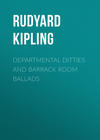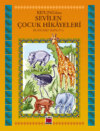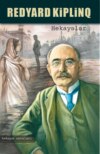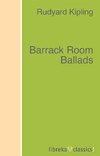Kitabı oku: «Departmental Ditties and Barrack Room Ballads», sayfa 5
Yazı tipi:
THE LAMENT OF THE BORDER CATTLE THIEF
O woe is me for the merry life
I led beyond the Bar,
And a treble woe for my winsome wife
That weeps at Shalimar.
They have taken away my long jezail,
My shield and sabre fine,
And heaved me into the Central jail
For lifting of the kine.
The steer may low within the byre,
The Jat may tend his grain,
But there’ll be neither loot nor fire
Till I come back again.
And God have mercy on the Jat
When once my fetters fall,
And Heaven defend the farmer’s hut
When I am loosed from thrall.
It’s woe to bend the stubborn back
Above the grinching quern,
It’s woe to hear the leg-bar clack
And jingle when I turn!
But for the sorrow and the shame,
The brand on me and mine,
I’ll pay you back in leaping flame
And loss of the butchered kine.
For every cow I spared before
In charity set free,
If I may reach my hold once more
I’ll reive an honest three.
For every time I raised the low
That scared the dusty plain,
By sword and cord, by torch and tow
I’ll light the land with twain!
Ride hard, ride hard to Abazai,
Young Sahib with the yellow hair —
Lie close, lie close as khuttucks lie,
Fat herds below Bonair!
The one I’ll shoot at twilight-tide,
At dawn I’ll drive the other;
The black shall mourn for hoof and hide,
The white man for his brother.
‘Tis war, red war, I’ll give you then,
War till my sinews fail;
For the wrong you have done to a chief of men,
And a thief of the Zukka Kheyl.
And if I fall to your hand afresh
I give you leave for the sin,
That you cram my throat with the foul pig’s flesh,
And swing me in the skin!
THE RHYME OF THE THREE CAPTAINS
This ballad appears to refer to one of the exploits of the notorious Paul
Jones, the American pirate. It is founded on fact.
… At the close of a winter day,
Their anchors down, by London town, the Three Great Captains lay;
And one was Admiral of the North from Solway Firth to Skye,
And one was Lord of the Wessex coast and all the lands thereby,
And one was Master of the Thames from Limehouse to Blackwall,
And he was Captain of the Fleet – the bravest of them all.
Their good guns guarded their great gray sides that were thirty foot in the sheer,
When there came a certain trading-brig with news of a privateer.
Her rigging was rough with the clotted drift that drives in a Northern breeze,
Her sides were clogged with the lazy weed that spawns in the Eastern seas.
Light she rode in the rude tide-rip, to left and right she rolled,
And the skipper sat on the scuttle-butt and stared at an empty hold.
“I ha’ paid Port dues for your Law,” quoth he, “and where is the Law ye boast
If I sail unscathed from a heathen port to be robbed on a Christian coast?
Ye have smoked the hives of the Laccadives as we burn the lice in a bunk,
We tack not now to a Gallang prow or a plunging Pei-ho junk;
I had no fear but the seas were clear as far as a sail might fare
Till I met with a lime-washed Yankee brig that rode off Finisterre.
“There were canvas blinds to his bow-gun ports to screen the weight he bore,
And the signals ran for a merchantman from Sandy Hook to the Nore.
“He would not fly the Rovers’ flag – the bloody or the black,
But now he floated the Gridiron and now he flaunted the Jack.
He spoke of the Law as he crimped my crew – he swore it was only a loan;
But when I would ask for my own again, he swore it was none of my own.
“He has taken my little parrakeets that nest beneath the Line,
He has stripped my rails of the shaddock-frails and the green unripened pine;
He has taken my bale of dammer and spice I won beyond the seas,
He has taken my grinning heathen gods – and what should he want o’ these?
My foremast would not mend his boom, my deckhouse patch his boats;
He has whittled the two, this Yank Yahoo, to peddle for shoe-peg oats.
“I could not fight for the failing light and a rough beam-sea beside,
But I hulled him once for a clumsy crimp and twice because he lied.
“Had I had guns (as I had goods) to work my Christian harm,
I had run him up from his quarter-deck to trade with his own yard-arm;
I had nailed his ears to my capstan-head, and ripped them off with a saw,
And soused them in the bilgewater, and served them to him raw;
I had flung him blind in a rudderless boat to rot in the rocking dark,
I had towed him aft of his own craft, a bait for his brother shark;
I had lapped him round with cocoa husk, and drenched him with the oil,
And lashed him fast to his own mast to blaze above my spoil;
I had stripped his hide for my hammock-side, and tasselled his beard i’ the
mesh,
And spitted his crew on the live bamboo that grows through the gangrened flesh;
I had hove him down by the mangroves brown, where the mud-reef sucks and draws,
Moored by the heel to his own keel to wait for the land-crab’s claws!
He is lazar within and lime without, ye can nose him far enow,
For he carries the taint of a musky ship – the reek of the slaver’s dhow!”
The skipper looked at the tiering guns and the bulwarks tall and cold,
And the Captains Three full courteously peered down at the gutted hold,
And the Captains Three called courteously from deck to scuttle-butt: —
“Good Sir, we ha’ dealt with that merchantman or ever your teeth were cut.
“Your words be words of a lawless race, and the Law it standeth thus:
He comes of a race that have never a Law, and he never has boarded us.
“We ha’ sold him canvas and rope and spar – we know that his price is fair,
And we know that he weeps for the lack of a Law as he rides off Finisterre.
“And since he is damned for a gallows-thief by you and better than you,
We hold it meet that the English fleet should know that we hold him true.”
The skipper called to the tall taffrail: – “And what is that to me?
Did ever you hear of a Yankee brig that rifled a Seventy-three?
Do I loom so large from your quarter-deck that I lift like a ship o’ the Line?
He has learned to run from a shotted gun and harry such craft as mine.
“There is never a Law on the Cocos Keys to hold a white man in,
But we do not steal the niggers’ meal, for that is a nigger’s sin.
“Must he have his Law as a quid to chaw, or laid in brass on his wheel?
Does he steal with tears when he buccaneers? ‘Fore Gad, then, why does he steal?”
The skipper bit on a deep-sea word, and the word it was not sweet,
For he could see the Captains Three had signalled to the Fleet.
But three and two, in white and blue, the whimpering flags began: —
“We have heard a tale of a – foreign sail, but he is a merchantman.”
The skipper peered beneath his palm and swore by the Great Horn Spoon: —
“‘Fore Gad, the Chaplain of the Fleet would bless my picaroon!”
By two and three the flags blew free to lash the laughing air: —
“We have sold our spars to the merchantman – we know that his price is fair.”
The skipper winked his Western eye, and swore by a China storm: —
“They ha’ rigged him a Joseph’s jury-coat to keep his honour warm.”
The halliards twanged against the tops, the bunting bellied broad,
The skipper spat in the empty hold and mourned for a wasted cord.
Masthead – masthead, the signal sped by the line o’ the British craft;
The skipper called to his Lascar crew, and put her about and laughed: —
“It’s mainsail haul, my bully boys all – we’ll out to the seas again —
Ere they set us to paint their pirate saint, or scrub at his grapnel-chain.
“It’s fore-sheet free, with her head to the sea, and the swing of the unbought brine —
We’ll make no sport in an English court till we come as a ship o’ the Line:
Till we come as a ship o’ the Line, my lads, of thirty foot in the sheer,
Lifting again from the outer main with news of a privateer;
Flying his pluck at our mizzen-truck for weft of Admiralty,
Heaving his head for our dipsey-lead in sign that we keep the sea.
“Then fore-sheet home as she lifts to the foam – we stand on the outward tack,
We are paid in the coin of the white man’s trade – the bezant is hard, ay, and black.
“The frigate-bird shall carry my word to the Kling and the Orang-Laut
How a man may sail from a heathen coast to be robbed in a Christian port;
How a man may be robbed in Christian port while Three Great Captains there
Shall dip their flag to a slaver’s rag – to show that his trade is fair!”
THE BALLAD OF THE CLAMPHERDOWN
It was our war-ship Clampherdown
Would sweep the Channel clean,
Wherefore she kept her hatches close
When the merry Channel chops arose,
To save the bleached marine.
She had one bow-gun of a hundred ton,
And a great stern-gun beside;
They dipped their noses deep in the sea,
They racked their stays and stanchions free
In the wash of the wind-whipped tide.
It was our war-ship Clampherdown,
Fell in with a cruiser light
That carried the dainty Hotchkiss gun
And a pair o’ heels wherewith to run
From the grip of a close-fought fight.
She opened fire at seven miles —
As ye shoot at a bobbing cork —
And once she fired and twice she fired,
Till the bow-gun drooped like a lily tired
That lolls upon the stalk.
“Captain, the bow-gun melts apace,
The deck-beams break below,
‘Twere well to rest for an hour or twain,
And patch the shattered plates again.”
And he answered, “Make it so.”
She opened fire within the mile —
As ye shoot at the flying duck —
And the great stern-gun shot fair and true,
With the heave of the ship, to the stainless blue,
And the great stern-turret stuck.
“Captain, the turret fills with steam,
The feed-pipes burst below —
You can hear the hiss of the helpless ram,
You can hear the twisted runners jam.”
And he answered, “Turn and go!”
It was our war-ship Clampherdown,
And grimly did she roll;
Swung round to take the cruiser’s fire
As the White Whale faces the Thresher’s ire
When they war by the frozen Pole.
“Captain, the shells are falling fast,
And faster still fall we;
And it is not meet for English stock
To bide in the heart of an eight-day clock
The death they cannot see.”
“Lie down, lie down, my bold A.B.,
We drift upon her beam;
We dare not ram, for she can run;
And dare ye fire another gun,
And die in the peeling steam?”
It was our war-ship Clampherdown
That carried an armour-belt;
But fifty feet at stern and bow
Lay bare as the paunch of the purser’s sow,
To the hail of the Nordenfeldt.
“Captain, they hack us through and through;
The chilled steel bolts are swift!
We have emptied the bunkers in open sea,
Their shrapnel bursts where our coal should be.”
And he answered, “Let her drift.”
It was our war-ship Clampherdown,
Swung round upon the tide,
Her two dumb guns glared south and north,
And the blood and the bubbling steam ran forth,
And she ground the cruiser’s side.
“Captain, they cry, the fight is done,
They bid you send your sword.”
And he answered, “Grapple her stern and bow.
They have asked for the steel. They shall have it now;
Out cutlasses and board!”
It was our war-ship Clampherdown
Spewed up four hundred men;
And the scalded stokers yelped delight,
As they rolled in the waist and heard the fight
Stamp o’er their steel-walled pen.
They cleared the cruiser end to end,
From conning-tower to hold.
They fought as they fought in Nelson’s fleet;
They were stripped to the waist, they were bare to the feet,
As it was in the days of old.
It was the sinking Clampherdown
Heaved up her battered side —
And carried a million pounds in steel,
To the cod and the corpse-fed conger-eel,
And the scour of the Channel tide.
It was the crew of the Clampherdown
Stood out to sweep the sea,
On a cruiser won from an ancient foe,
As it was in the days of long ago,
And as it still shall be.
THE BALLAD OF THE “BOLIVAR”
Seven men from all the world, back to Docks again,
Rolling down the Ratcliffe Road drunk and raising Cain:
Give the girls another drink ‘fore we sign away —
We that took the Bolivar out across the Bay!
We put out from Sunderland loaded down with rails;
We put back to Sunderland ‘cause our cargo shifted;
We put out from Sunderland – met the winter gales —
Seven days and seven nights to the Start we drifted.
Racketing her rivets loose, smoke-stack white as snow,
All the coals adrift adeck, half the rails below,
Leaking like a lobster-pot, steering like a dray —
Out we took the Bolivar, out across the Bay!
One by one the Lights came up, winked and let us by;
Mile by mile we waddled on, coal and fo’c’sle short;
Met a blow that laid us down, heard a bulkhead fly;
Left the Wolf behind us with a two-foot list to port.
Trailing like a wounded duck, working out her soul;
Clanging like a smithy-shop after every roll;
Just a funnel and a mast lurching through the spray —
So we threshed the Bolivar out across the Bay!
‘Felt her hog and felt her sag, betted when she’d break;
Wondered every time she raced if she’d stand the shock;
Heard the seas like drunken men pounding at her strake;
Hoped the Lord ‘ud keep his thumb on the plummer-block.
Banged against the iron decks, bilges choked with coal;
Flayed and frozen foot and hand, sick of heart and soul;
Last we prayed she’d buck herself into judgment Day —
Hi! we cursed the Bolivar – knocking round the Bay!
O her nose flung up to sky, groaning to be still —
Up and down and back we went, never time for breath;
Then the money paid at Lloyd’s caught her by the heel,
And the stars ran round and round dancin’ at our death.
Aching for an hour’s sleep, dozing off between;
‘Heard the rotten rivets draw when she took it green;
‘Watched the compass chase its tail like a cat at play —
That was on the Bolivar, south across the Bay.
Once we saw between the squalls, lyin’ head to swell —
Mad with work and weariness, wishin’ they was we —
Some damned Liner’s lights go by like a long hotel;
Cheered her from the Bolivar – swampin’ in the sea.
Then a grayback cleared us out, then the skipper laughed;
“Boys, the wheel has gone to Hell – rig the winches aft!
Yoke the kicking rudder-head – get her under way!”
So we steered her, pulley-haul, out across the Bay!
Just a pack o’ rotten plates puttied up with tar,
In we came, an’ time enough, ‘cross Bilbao Bar.
Overloaded, undermanned, meant to founder, we
Euchred God Almighty’s storm, bluffed the Eternal Sea!
Seven men from all the world, back to town again,
Rollin’ down the Ratcliffe Road drunk and raising Cain:
Seven men from out of Hell. Ain’t the owners gay,
‘Cause we took the “Bolivar” safe across the Bay?
THE ENGLISH FLAG
Above the portico a flag-staff, bearing the Union Jack,
remained fluttering in the flames for some time, but ultimately
when it fell the crowds rent the air with shouts,
and seemed to see significance in the incident. – DAILY PAPERS.
Winds of the World, give answer! They are whimpering to and fro —
And what should they know of England who only England know? —
The poor little street-bred people that vapour and fume and brag,
They are lifting their heads in the stillness to yelp at the English Flag!
Must we borrow a clout from the Boer – to plaster anew with dirt?
An Irish liar’s bandage, or an English coward’s shirt?
We may not speak of England; her Flag’s to sell or share.
What is the Flag of England? Winds of the World, declare!
The North Wind blew: – “From Bergen my steel-shod vanguards go;
I chase your lazy whalers home from the Disko floe;
By the great North Lights above me I work the will of God,
And the liner splits on the ice-field or the Dogger fills with cod.
“I barred my gates with iron, I shuttered my doors with flame,
Because to force my ramparts your nutshell navies came;
I took the sun from their presence, I cut them down with my blast,
And they died, but the Flag of England blew free ere the spirit passed.
“The lean white bear hath seen it in the long, long Arctic night,
The musk-ox knows the standard that flouts the Northern Light:
What is the Flag of England? Ye have but my bergs to dare,
Ye have but my drifts to conquer. Go forth, for it is there!”
The South Wind sighed: – “From the Virgins my mid-sea course was ta’en
Over a thousand islands lost in an idle main,
Where the sea-egg flames on the coral and the long-backed breakers croon
Their endless ocean legends to the lazy, locked lagoon.
“Strayed amid lonely islets, mazed amid outer keys,
I waked the palms to laughter – I tossed the scud in the breeze —
Never was isle so little, never was sea so lone,
But over the scud and the palm-trees an English flag was flown.
“I have wrenched it free from the halliard to hang for a wisp on the Horn;
I have chased it north to the Lizard – ribboned and rolled and torn;
I have spread its fold o’er the dying, adrift in a hopeless sea;
I have hurled it swift on the slaver, and seen the slave set free.
“My basking sunfish know it, and wheeling albatross,
Where the lone wave fills with fire beneath the Southern Cross.
What is the Flag of England? Ye have but my reefs to dare,
Ye have but my seas to furrow. Go forth, for it is there!”
The East Wind roared: – “From the Kuriles, the Bitter Seas, I come,
And me men call the Home-Wind, for I bring the English home.
Look – look well to your shipping! By the breath of my mad typhoon
I swept your close-packed Praya and beached your best at Kowloon!
“The reeling junks behind me and the racing seas before,
I raped your richest roadstead – I plundered Singapore!
I set my hand on the Hoogli; as a hooded snake she rose,
And I flung your stoutest steamers to roost with the startled crows.
“Never the lotus closes, never the wild-fowl wake,
But a soul goes out on the East Wind that died for England’s sake —
Man or woman or suckling, mother or bride or maid —
Because on the bones of the English the English Flag is stayed.
“The desert-dust hath dimmed it, the flying wild-ass knows,
The scared white leopard winds it across the taintless snows.
What is the Flag of England? Ye have but my sun to dare,
Ye have but my sands to travel. Go forth, for it is there!”
The West Wind called: – “In squadrons the thoughtless galleons fly
That bear the wheat and cattle lest street-bred people die.
They make my might their porter, they make my house their path,
Till I loose my neck from their rudder and whelm them all in my wrath.
“I draw the gliding fog-bank as a snake is drawn from the hole,
They bellow one to the other, the frighted ship-bells toll,
For day is a drifting terror till I raise the shroud with my breath,
And they see strange bows above them and the two go locked to death.
“But whether in calm or wrack-wreath, whether by dark or day,
I heave them whole to the conger or rip their plates away,
First of the scattered legions, under a shrieking sky,
Dipping between the rollers, the English Flag goes by.
“The dead dumb fog hath wrapped it – the frozen dews have kissed —
The naked stars have seen it, a fellow-star in the mist.
What is the Flag of England? Ye have but my breath to dare,
Ye have but my waves to conquer. Go forth, for it is there!”
“CLEARED”
(In Memory of a Commission)
Help for a patriot distressed, a spotless spirit hurt,
Help for an honorable clan sore trampled in the dirt!
From Queenstown Bay to Donegal, O listen to my song,
The honorable gentlemen have suffered grievous wrong.
Their noble names were mentioned – O the burning black disgrace! —
By a brutal Saxon paper in an Irish shooting-case;
They sat upon it for a year, then steeled their heart to brave it,
And “coruscating innocence” the learned Judges gave it.
Bear witness, Heaven, of that grim crime beneath the surgeon’s knife,
The honorable gentlemen deplored the loss of life;
Bear witness of those chanting choirs that burk and shirk and snigger,
No man laid hand upon the knife or finger to the trigger!
Cleared in the face of all mankind beneath the winking skies,
Like phoenixes from Phoenix Park (and what lay there) they rise!
Go shout it to the emerald seas-give word to Erin now,
Her honorable gentlemen are cleared – and this is how:
They only paid the Moonlighter his cattle-hocking price,
They only helped the murderer with council’s best advice,
But – sure it keeps their honor white – the learned Court believes
They never gave a piece of plate to murderers and thieves.
They ever told the ramping crowd to card a woman’s hide,
They never marked a man for death – what fault of theirs he died? —
They only said “intimidate,” and talked and went away —
By God, the boys that did the work were braver men than they!
Their sin it was that fed the fire – small blame to them that heard
The “bhoys” get drunk on rhetoric, and madden at the word —
They knew whom they were talking at, if they were Irish too,
The gentlemen that lied in Court, they knew and well they knew.
They only took the Judas-gold from Fenians out of jail,
They only fawned for dollars on the blood-dyed Clan-na-Gael.
If black is black or white is white, ill black and white it’s down,
They’re only traitors to the Queen and rebels to the Crown.
“Cleared,” honorable gentlemen. Be thankful it’s no more:
The widow’s curse is on your house, the dead are at your door.
On you the shame of open shame, on you from North to South
The band of every honest man flat-heeled across your mouth.
“Less black than we were painted”? – Faith, no word of black was said;
The lightest touch was human blood, and that, ye know, runs red.
It’s sticking to your fist today for all your sneer and scoff,
And by the Judge’s well-weighed word you cannot wipe it off.
Hold up those hands of innocence – go, scare your sheep, together,
The blundering, tripping tups that bleat behind the old bell-wether;
And if they snuff the taint and break to find another pen,
Tell them it’s tar that glistens so, and daub them yours again!
“The charge is old”? – As old as Cain – as fresh as yesterday;
Old as the Ten Commandments, have ye talked those laws away?
If words are words, or death is death, or powder sends the ball,
You spoke the words that sped the shot – the curse be on you all.
“Our friends believe”? Of course they do – as sheltered women may;
But have they seen the shrieking soul ripped from the quivering clay?
They – If their own front door is shut, they’ll swear the whole world’s warm;
What do they know of dread of death or hanging fear of harm?
The secret half a country keeps, the whisper in the lane,
The shriek that tells the shot went home behind the broken pane,
The dry blood crisping in the sun that scares the honest bees,
And shows the “bhoys” have heard your talk – what do they know of these?
But you – you know – ay, ten times more; the secrets of the dead,
Black terror on the country-side by word and whisper bred,
The mangled stallion’s scream at night, the tail-cropped heifer’s low.
Who set the whisper going first? You know, and well you know!
My soul! I’d sooner lie in jail for murder plain and straight,
Pure crime I’d done with my own hand for money, lust, or hate,
Than take a seat in Parliament by fellow-felons cheered,
While one of those “not provens” proved me cleared as you are cleared.
Cleared – you that “lost” the League accounts – go, guard our honor still,
Go, help to make our country’s laws that broke God’s laws at will —
One hand stuck out behind the back, to signal “strike again”;
The other on your dress-shirt front to show your heart is @dane,
If black is black or white is white, in black and white it’s down,
You’re only traitors to the Queen and but rebels to the Crown
If print is print or words are words, the learned Court perpends:
We are not ruled by murderers, only – by their friends.
Türler ve etiketler
Yaş sınırı:
12+Litres'teki yayın tarihi:
27 eylül 2017Hacim:
110 s. 1 illüstrasyonTelif hakkı:
Public Domain









